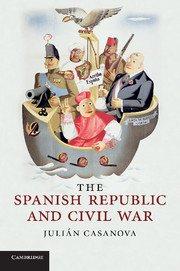Book contents
- Frontmatter
- Contents
- List of maps
- Chronology
- Introduction
- Part I Republic
- 1 The winds of change
- 2 The constraints of democracy
- 3 Order and religion
- 4 Reshaping the Republic
- 5 The seeds of confrontation
- Part II Civil war
- Epilogue: Why did the Republic lose the war?
- Glossary
- Appendix 1 Leading figures
- Appendix 2 Political parties and organisations
- Index
- References
5 - The seeds of confrontation
Published online by Cambridge University Press: 05 June 2012
- Frontmatter
- Contents
- List of maps
- Chronology
- Introduction
- Part I Republic
- 1 The winds of change
- 2 The constraints of democracy
- 3 Order and religion
- 4 Reshaping the Republic
- 5 The seeds of confrontation
- Part II Civil war
- Epilogue: Why did the Republic lose the war?
- Glossary
- Appendix 1 Leading figures
- Appendix 2 Political parties and organisations
- Index
- References
Summary
The Frente Popular coalition won the polls and for many people this represented the second act of a play that had begun in April 1931, only to be interrupted in the summer of 1933. It was indeed a second opportunity for Manuel Azaña, once more in power and with rejoicing in the streets; for the socialists, who once again had a strong influence on local powers; and for the anarcho-syndicalists, who were able to recover their capacity for unrest, and some of the social benefits they had lost.
The leading players may have returned, but the atmosphere after the left's victory bore little relation to the one that reigned in the spring of 1931 that saw the birth of the Republic. The Partido Radical, the oldest of the republican parties, the founder of the Republic and the governing party between September 1933 and December 1935, sank without trace in the elections. The upper classes felt threatened by the new thrust from the trade union organisations and social conflicts. The defeated non-republican right now thought only of force as a resource against the government and the Republic. A significant sector of the army plotted against them and did not stop until they were defeated. February 1936 saw free democratic elections; July 1936, a coup d'état. History accelerated over those five months.
- Type
- Chapter
- Information
- The Spanish Republic and Civil War , pp. 125 - 150Publisher: Cambridge University PressPrint publication year: 2010

